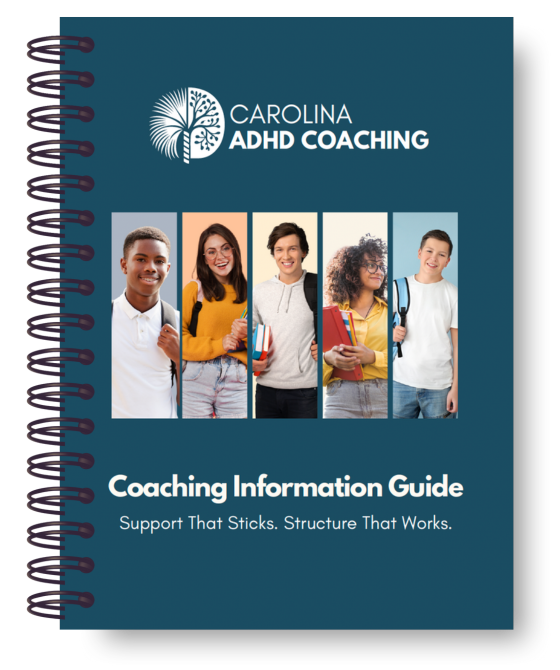Your child or teen has ADHD—or maybe they’re dealing with executive function challenges that are leaving school, home life, or daily routines feeling overwhelming.
And now, a coach has been recommended… leaving you wondering: What is an ADHD coach? Could a coach really help? Is this the right next step for your child?
If you’re exploring the idea of ADHD coaching, you’re in the right place. We’ll walk you through exactly what ADHD coaching is, how it works, and how it helps teens and young adults build the skills they need to thrive.
⭐ Quick Takeaway:
ADHD coaching isn’t about “fixing” your child. It’s about helping them develop tools, confidence, and independence—step by step.
Keep reading to see how coaching can support your family’s journey.

What Does an ADHD Coach Do?
An ADHD coach helps students and young adults develop real-world skills to better manage life with ADHD and executive function challenges.
Unlike tutoring (which focuses on subject matter) or therapy (which often focuses on emotions or the past), ADHD coaching is forward-focused and practical. It’s about helping students learn how to manage the day-to-day skills that school doesn’t always teach—skills like:
✅ Time management (getting started, staying on track)
✅ Organization (managing homework, backpacks, digital clutter)
✅ Planning and prioritization (figuring out what to do first)
✅ Task initiation (getting “unstuck” and taking action)
✅ Emotional regulation (managing overwhelm and frustration)
✅ Follow-through (actually finishing tasks—not just starting them)
ADHD coaches also provide something else that’s key: consistent accountability.
In coaching sessions, students set goals and practice strategies—and in between sessions, their coach helps them stay on track and reflect on what’s working (and what’s not). Over time, students build the confidence and independence to manage more on their own.
For teens especially, having a coach outside the parent/child dynamic can be a game-changer.
Many parents tell us: “They just won’t listen to me anymore!” Coaching gives teens a neutral, trusted partner to guide them—without the power struggles.

How Is ADHD Coaching Different From Other Supports?
Students working with ADHD coaches often experience a boost of up to one full letter grade on average—driven by better study habits and organizational skills. (Sources: Psychology Today, BioMed Central)
When families first explore ADHD coaching, a common question is:
“What is an ADHD Coach and how is this different from what we’re already doing?”
Here’s how ADHD coaching stands apart—and complements the supports you may already have in place:
✅ It’s not therapy. Therapy focuses on emotions, mental health, and often the past. ADHD coaching is action-oriented and forward-focused—it helps students build skills to manage daily life, not process emotions.
✅ It’s not tutoring. Tutors help with subject-specific academic content. ADHD coaching targets executive function skills that support success across all subjects—and beyond the classroom.
✅ It builds on IEP/504 supports. Accommodations like extra time or a quiet space are important—but they don’t teach skills like organization or time management. ADHD coaching helps students develop those missing pieces—so they can use accommodations more effectively and function more independently.
✅ It supports the whole student. Coaching is personalized. It looks at how ADHD shows up in your child’s unique life—at school, at home, socially, and in transitions like moving toward college or adulthood.
✅ It provides neutral accountability. Let’s be real—teens and young adults often resist help from parents. An ADHD coach offers a trusted, neutral partner who helps them take ownership of their growth—without the parent/child tug-of-war.
Together with school supports and family encouragement, ADHD coaching helps bridge the gap between where a student is now—and where they’re capable of going.
Why More Families Are Choosing ADHD Coaching
Clients typically see a 75% improvement in organization—tracking assignments, meeting deadlines, and managing physical/digital spaces. (Source: BioMed Central)
Over 80% of clients report improved time management skills—leading to higher productivity and lower stress in both school and personal tasks. (Source: ERIC)
More and more parents are discovering that ADHD coaching fills a gap traditional supports can’t always meet.
Here’s why families are turning to ADHD coaching to help their teens and young adults thrive:
✅ To reduce daily stress and family conflict. When homework turns into meltdowns and routines feel like constant battles, an outside coach can shift the dynamic—and help restore calm at home.
✅ To build life skills, not just school skills. Parents know their child needs more than passing grades—they need to learn how to manage time, stay organized, and navigate life beyond the classroom.
✅ To support teens moving toward independence. High school and college come fast. ADHD coaching helps students build the executive function skills they’ll need for life transitions—whether that’s prepping for college, managing a part-time job, or planning for the future.
✅ To bridge the gap when IEPs/504s aren’t enough. Accommodations help, but they often don’t address how to build and practice real-world skills. Coaching provides that hands-on, personalized learning.
✅ To give teens a neutral accountability partner. Let’s face it: many teens simply won’t take guidance from their parents (no matter how loving!). A coach becomes a trusted, neutral guide who helps them own their progress.
ADHD coaching helps students move from “getting by” to building true confidence, independence, and self-management skills.
It’s one of the most supportive investments families can make to help their child thrive—not just in school, but in life.

Looking for a Coach for Your Teen or Young Adult?
- If you’re in Upstate South Carolina, or Charlotte North Carolina, explore: Local Coaching Options
- We also work with clients across the U.S.! Explore: Online ADHD Coaching
Nearly 90% of individuals coached for ADHD achieve personal and academic goals more consistently—thanks to structured support and accountability. (Source: BioMed Central)
Common Outcomes of ADHD Coaching
Wondering what kind of results families typically see with ADHD coaching?
Quick takeaway: ADHD coaching builds skills that help students now—and set them up for long-term success in school, work, and life.
While every student is unique, here are some of the most common outcomes parents report after consistent coaching:
✅ Improved time management — students start planning ahead and meeting deadlines more consistently
✅ Better organization — both physical (backpacks, bedrooms) and digital (assignments, calendars)
✅ Increased follow-through — fewer unfinished tasks, more projects actually completed
✅ Reduced overwhelm at home — fewer emotional meltdowns around school and routines
✅ Higher self-confidence — students begin to trust themselves to handle responsibilities
✅ Greater independence — students take more ownership of their day-to-day life and goals
✅ Smoother transitions — better preparation for big changes like starting high school, heading to college, or managing early adulthood.

Get an inside look at how our coaching works, what to expect, and how to get started. It’s free — and packed with helpful info for parents and students!
Download the Guide


